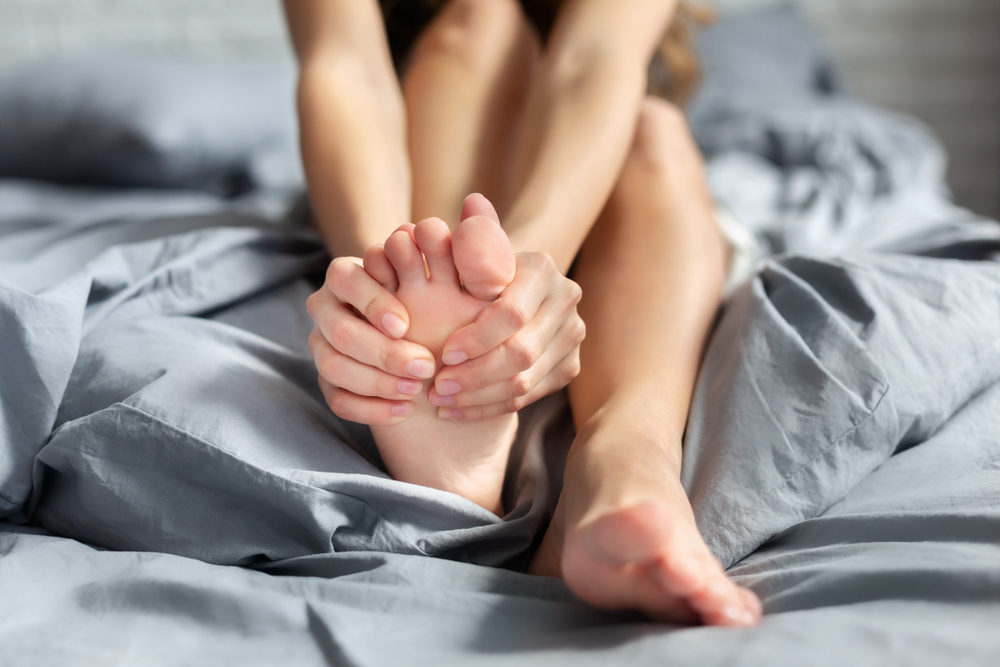
Have you ever gone to bed at night, and soon after laying down felt an unpleasant pain in your legs? Leg cramps during the night, more commonly referred to as nocturnal leg cramps or charley horses, are fairly common. Essentially, they’re characterized by abrupt spasms in leg muscles that are painful and uncomfortable. As a leading Long Island orthopedist, nocturnal leg cramps are an issue experienced by many of our patients. According to a report published in American Family Physician, 60% of adults and 7% of children regularly experience them throughout the night.
More often than not, they’re concentrated in the calf muscles. However, some also experience them in feet and thighs. Pain management for nocturnal leg cramps is possible, and there are also prevention methods to reduce the frequency.
What Are Nocturnal Leg Cramps?
In a nutshell, nocturnal leg cramps are uncontrollable and involuntary spasms within the leg. The spasms are caused by a sudden tension within the leg muscles, which causes the discomfort. The pain experienced from nocturnal leg cramps ranges from moderate to severe. Also, pain varies based on the tightness and tension within the muscle.
Nocturnal leg cramps, though not a critical issue which needs immediate medical attention, can lead to additional issues. Often the pain and discomfort is enough to keep someone with nocturnal leg cramps wide awake at night, disrupting their sleep. The day after the cramps, they’re often lethargic and exhausted from sleep deprivation. Leg cramps that are severe enough can lead to insomnia if experienced over time.
Nocturnal Leg Cramps vs. Restless Leg Syndrome
Many people often confuse nocturnal leg cramps with restless legs syndrome. Nocturnal leg cramps describe the pain experienced from muscle tension and spasms. And, restless leg syndrome is characterized by the strange and unpleasant urge to move the legs in order to mitigate a feeling of discomfort.
What Causes It?
Some have suggested that nocturnal leg cramps are the result of severe mineral deficiencies, however, the evidence supporting this theory is limited at best. The notion that regular intake of mineral supplements will relieve leg cramps has been proven false.
Essentially, the general medical opinion is that nocturnal leg cramps are caused by muscle fatigue. Those who exert themselves more often, such as athletes or laborers, are more likely to experience nocturnal leg cramps. Standing for long periods of time throughout the day can wear out muscles, as well. Tiring out muscles during the day can cause nocturnal leg cramps.
It is widely believed that intense physical activity during the day can induce nocturnal leg cramps. However, there is also evidence to support the theory that extended inactivity can do the same. While exhausting muscles with labor and exercise can lead to these cramps, long periods of time spent without stretching can as well. Not properly stretching or exercising can cause your muscles to shorten. Less physical activity, like too much physical activity, can cause nocturnal leg cramps.
Many people taking specific medications experience nocturnal leg cramps as a side effect. If you’re suffering from spasms in your legs at night, check any prescriptions you might be taking for their list of side effects.
What Can I Do?
There are simple home remedies to help alleviate pain. Do your best to stretch your muscles regularly to prevent any tension. Massaging the affected area with your hands or a massage device is equally effective. Applying heat to the muscles and flexing your feet to stretch your calves can also relieve the pain.
To prevent nocturnal leg cramps, drink water regularly to keep your muscles hydrated. Hydration will encourage the proper function of your muscles.
If any of these remedies don’t deliver results, call us to make an appointment today.
Conclusion
Nocturnal leg cramps are a very common issue. Trying out these home remedies can relieve you of the pain and discomfort. In the event that they persist and interfere with your sleep on a regular basis, it’s best to consult a doctor for a complete diagnosis. Central Orthopedic Group can help you manage and eradicate the pain, and get you back on a regular, healthy sleep cycle.
